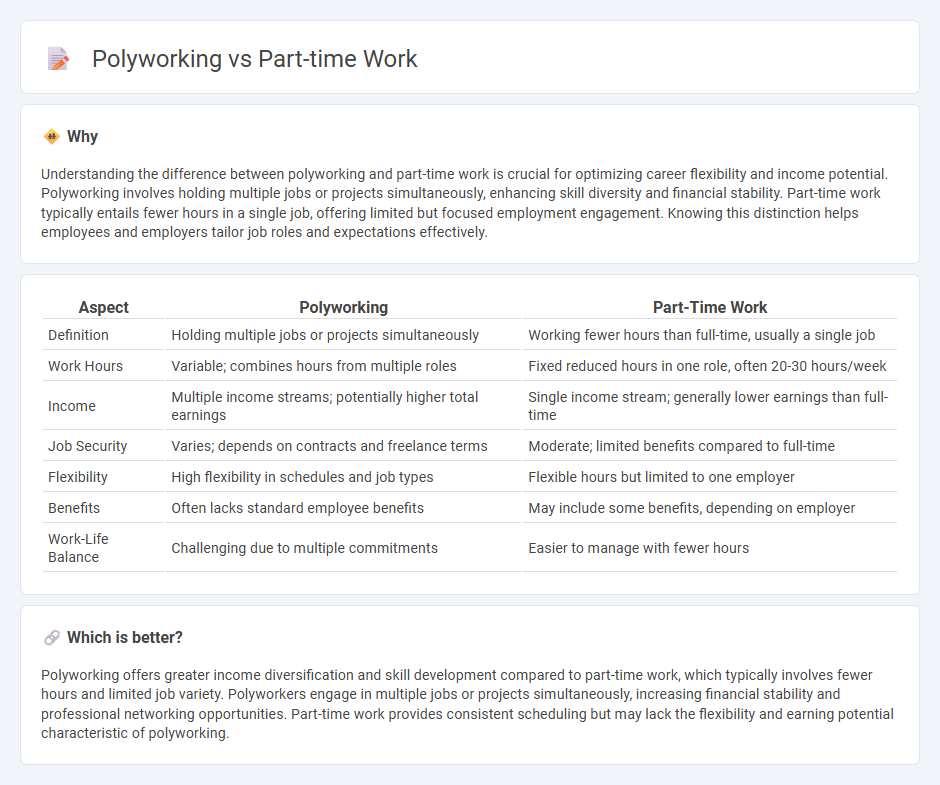
Polyworking involves managing multiple jobs or freelance gigs simultaneously, providing diverse income streams and skill development opportunities. Part-time work typically refers to a single job with reduced hours compared to full-time employment, offering more predictable schedules but fewer income sources. Explore the differences in flexibility, earnings, and career growth between polyworking and part-time work to find the best fit for your employment goals.
Why it is important
Understanding the difference between polyworking and part-time work is crucial for optimizing career flexibility and income potential. Polyworking involves holding multiple jobs or projects simultaneously, enhancing skill diversity and financial stability. Part-time work typically entails fewer hours in a single job, offering limited but focused employment engagement. Knowing this distinction helps employees and employers tailor job roles and expectations effectively.
Comparison Table
| Aspect | Polyworking | Part-Time Work |
|---|---|---|
| Definition | Holding multiple jobs or projects simultaneously | Working fewer hours than full-time, usually a single job |
| Work Hours | Variable; combines hours from multiple roles | Fixed reduced hours in one role, often 20-30 hours/week |
| Income | Multiple income streams; potentially higher total earnings | Single income stream; generally lower earnings than full-time |
| Job Security | Varies; depends on contracts and freelance terms | Moderate; limited benefits compared to full-time |
| Flexibility | High flexibility in schedules and job types | Flexible hours but limited to one employer |
| Benefits | Often lacks standard employee benefits | May include some benefits, depending on employer |
| Work-Life Balance | Challenging due to multiple commitments | Easier to manage with fewer hours |
Which is better?
Polyworking offers greater income diversification and skill development compared to part-time work, which typically involves fewer hours and limited job variety. Polyworkers engage in multiple jobs or projects simultaneously, increasing financial stability and professional networking opportunities. Part-time work provides consistent scheduling but may lack the flexibility and earning potential characteristic of polyworking.
Connection
Polyworking, involving multiple simultaneous jobs, and part-time work share a flexible structure that enables workers to diversify income sources and balance personal commitments. Both employment types cater to the evolving gig economy by promoting adaptability and reducing reliance on a single employer. This flexibility enhances workforce resilience and aligns with shifting labor market demands for varied work arrangements.
Key Terms
Working Hours
Part-time work typically involves fixed weekly hours ranging from 20 to 30, offering predictable schedules and consistent income, while polyworking encompasses managing multiple part-time jobs or freelance gigs with variable and often overlapping hours, demanding greater flexibility and time management. Research shows polyworkers often experience increased work hour diversity but face challenges in balancing workloads and avoiding burnout compared to traditional part-time employees. Explore detailed comparisons and strategies to optimize your work hours effectively in both arrangements.
Job Flexibility
Part-time work offers reduced hours that provide employees with a consistent schedule and predictable income while allowing more personal time. Polyworking involves juggling multiple jobs or roles simultaneously, offering greater diversity in tasks and income sources but requiring advanced time management skills. Explore how these approaches to job flexibility can fit different lifestyle needs and career goals.
Multiple Employers
Part-time work typically involves employment with a single employer for fewer hours than full-time, while polyworking means simultaneously holding multiple jobs with different employers, diversifying income streams and experiences. Employees engaged in polyworking benefit from enhanced skills, networking opportunities, and financial security, but must effectively manage time and commitments across various roles. Discover more about the strategic advantages and challenges of balancing multiple employers in the evolving labor market.
Source and External Links
Part-time job - Wikipedia - A part-time job is employment with fewer than 30 hours a week, often involving rotational shifts, and is chosen for various reasons including less stress or employer cutbacks; the International Labour Organization mandates fair treatment of part-time workers compared to full-time workers.
Part Time Jobs in Beaverton, OR (NOW HIRING) - ZipRecruiter - Part-time jobs typically involve 20 to 30 hours per week, with flexible scheduling across various industries like retail and fast food, often serving as a path to full-time employment.
Part Time jobs in Portland, Or - Indeed - There are thousands of part-time opportunities in Portland with roles in retail, food service, warehousing, and tutoring, offering competitive wages and flexible hours to fit different schedules.
 dowidth.com
dowidth.com